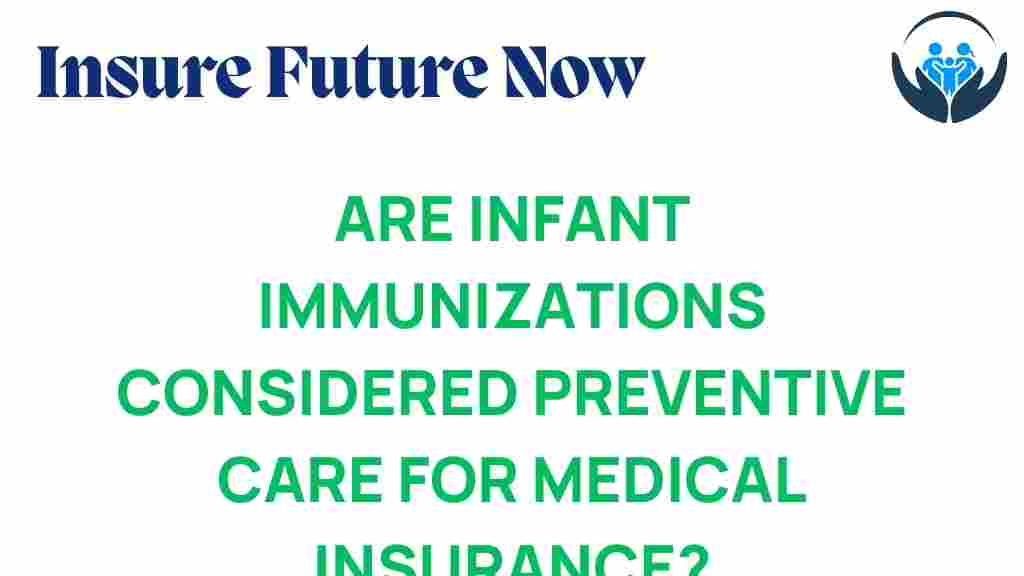Unraveling the Mystery: Are Infant Immunizations Preventive Care in Insurance?
Infant immunizations play a crucial role in ensuring child health and preventing the spread of infectious diseases. As parents navigate the complexities of healthcare coverage, a common question arises: Are infant immunizations considered preventive care under medical insurance? This article will explore the intersection of infant immunizations, preventive care, and insurance benefits, providing a comprehensive analysis of vaccination policies and their implications for child health.
Understanding Infant Immunizations
Infant immunizations are vaccines administered to newborns and young children to protect against various diseases. Vaccines are designed to stimulate the immune system, helping the body to recognize and fight off pathogens effectively. The following are some key points about infant immunizations:
- Schedule: The CDC recommends a vaccination schedule that includes several doses during infancy and early childhood.
- Types of Vaccines: Common vaccines include those for measles, mumps, rubella (MMR), diphtheria, tetanus, pertussis (DTaP), and polio.
- Benefits: Immunizations help prevent outbreaks of vaccine-preventable diseases, which can have serious consequences for child health.
The Role of Preventive Care in Medical Insurance
Preventive care refers to healthcare services that aim to prevent diseases or detect them early when they are most treatable. Medical insurance typically covers a range of preventive services at no cost to the insured. This can include:
- Annual check-ups
- Screenings (e.g., cholesterol, diabetes)
- Vaccinations
Understanding how preventive care is defined in the context of medical insurance is essential for parents trying to maximize their healthcare coverage for infant immunizations.
Are Infant Immunizations Covered as Preventive Care?
In many cases, infant immunizations are categorized as preventive care under medical insurance. The Affordable Care Act (ACA) mandates that most private health insurance plans cover certain preventive services, including vaccines, without charging a copayment or coinsurance.
Here’s how it works:
- Health Insurance Plans: Most health insurance plans are required to follow the ACA guidelines, which include a comprehensive list of preventive services.
- Vaccination Policies: The CDC’s recommended immunization schedule is generally used to determine what vaccines are covered.
- Insurance Benefits: Parents should review their plan details to confirm coverage for specific vaccines and any associated costs.
Healthcare Coverage and Infant Immunizations
Understanding the specific healthcare coverage options available is vital for ensuring that your child receives timely vaccinations. Here are a few key considerations:
- Type of Insurance: Medicaid and CHIP (Children’s Health Insurance Program) provide coverage for vaccinations for eligible children.
- Network Providers: Ensure that immunizations are administered by in-network providers to avoid unexpected costs.
- State Regulations: Some states have additional requirements regarding vaccination coverage that may affect your insurance plan.
Policy Analysis on Infant Immunizations
When analyzing vaccination policies, several factors come into play:
- Legislation: Federal and state laws govern the requirement for vaccinations and the insurance coverage related to them.
- Access to Care: Policies aimed at improving access to preventive care can increase vaccination rates among infants.
- Public Health Initiatives: Campaigns promoting the importance of childhood vaccinations can influence insurance benefits and parental choices.
Step-by-Step Process for Obtaining Coverage for Infant Immunizations
To ensure that infant immunizations are covered as preventive care under your medical insurance, follow these steps:
- Check Your Insurance Plan: Review your insurance policy to understand the coverage details for preventive services.
- Consult with Your Pediatrician: Schedule an appointment to discuss the recommended immunization schedule for your child.
- Contact Your Insurance Provider: Reach out to your insurance company to confirm the coverage for the specific vaccines recommended.
- Keep Records: Maintain accurate records of vaccinations and any insurance claims filed.
Troubleshooting Tips for Parents
If you encounter issues with insurance coverage for infant immunizations, consider the following troubleshooting tips:
- Document Everything: Keep detailed records of conversations with your insurance provider, including dates, times, and names of representatives.
- File an Appeal: If your claim for immunization coverage is denied, you have the right to appeal the decision.
- Seek Assistance: Reach out to local health departments or advocacy groups for help navigating insurance issues related to vaccinations.
Conclusion
Infant immunizations are a vital component of preventive care and are generally covered under medical insurance policies. Understanding the intricacies of healthcare coverage, vaccination policies, and insurance benefits can help parents ensure that their children receive necessary immunizations without incurring unexpected costs.
As healthcare policies continue to evolve, staying informed about your insurance plan and the benefits it offers for child health is essential. For more detailed information on health insurance policies and immunizations, consider visiting the CDC Vaccines and Immunizations page.
By unraveling the mystery surrounding infant immunizations and preventive care, parents can take proactive steps to safeguard their child’s health and well-being.
For further insights into how healthcare coverage impacts your family’s health, check out our article on Navigating Medical Insurance for Children.
This article is in the category Policies and created by InsureFutureNow Team
